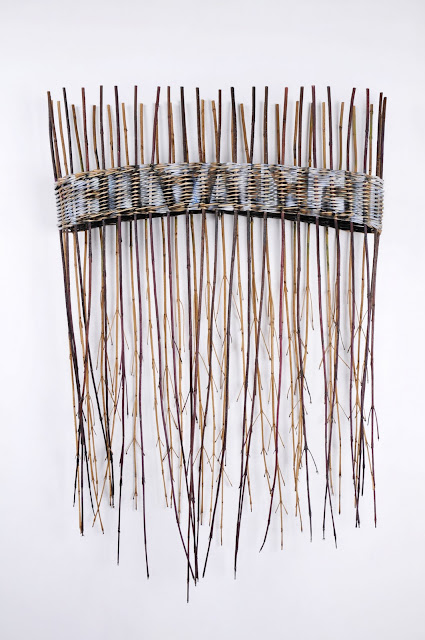TRUE NATURE 2011, painted applewood, willow and silver birch, 110 x 45 x 12 cms
Despite all the printed and handpainted notices I used to see on posts and fences in the countryside when I was a child spelling out TRESPASSERS WILL BE PROSECUTED, trespass was not and still is not a criminal offence in Britain.
April 24th 2012 will be the 80th anniversary of the Mass Trespass on Kinder Scout.
On Sunday 24th April 1932 a group of about 400 ramblers from Manchester, led by Benny Rothman, set off from Hayfield to cross the moors up to the top of Kinder. The aim of the trespass was to uphold the right of walkers to unrestricted access to uncultivated moorland. That same morning a group of ramblers from Sheffield (which included my grandparents) set off from Edale to join the Manchester group on top of the Kinder plateau - the highest point in the Peak District. On the plateau the Manchester ramblers came in conflict with the Duke of Devonshire's gamekeepers. One gamekeeper was injured in the ensuing scuffles and Benny Rothman and five others were arrested and tried for unlawful assembly and breach of the peace. They received jail sentences of up to six months.
A few weeks later, moved by the plight of the Kinder trespassers, a group of 10,000 ramblers - the largest in history - assembled for an access rally in Winnats Pass near Castleton.
These mass actions by walkers and ramblers led to the establishment of the National Parks in 1949 - including the Peak District National Park in Derbyshire which borders the southern edge of Sheffield.
The Duke of Devonshire was something of a 'baddy' to me when I little. He owned a lot property in the city and most of the land around Sheffield and we seemed to spend many a Sunday afternoon trespassing on it.
Although he worked in the steel industry my grandfather was a born countryman who loved annd great respect for nature. He'd been brought up on a large estate in Lincolnshire where his father, my great grandfather was head gardener and my great grandmother had been in service as a kitchen-maid. Grandy Marvell, as I knew him, came to Sheffield after the First World War to look for work in the factories. There, in the east end of Sheffield, he met my Grandmother Lizzie and they set up home in Bright Street, Carbrook in a two-up, two-down terraced house next door to the Brightside and Carbrook Co-operative Society Store.
By the mid 1950s they were able to afford to buy a small car - a stone grey coloured Ford Poplar, registration number OLA 583, the only car registration I've ever been able to remember. I loved that car dearly, it was my transport to heaven - a day out in the country-side every Sunday, summer or winter, rain or shine, snow or sleet. Grandy Marvell would be at the wheel, Nan-nan Marvell in the passenger seat and myself, my brother and cousin in the back. 'Slow down Frank we've got kiddies in't back' Nan-nan would say if the speedometer ever nudged over 30mph.
In the summer there'd be picnics on the moors above Toads Mouth and the ancient iron age settlement at Carl Wark. In the winter we'd walk through the snow to visit Tip's grave at Ladybower Dam and drink hot beef tea to keep warm.
We were taught to respect the country-side: keep to well-trodden paths where possible - they are the safest, close all gates behind you and never, ever drop litter. Wildflowers we could pick (no longer alas) but we were also taught their common names: toadflax, cuckoo pint, ragged robin, lady's slipper and eggs and bacon. Wild berries we foraged for in their season; blackberries, bilberries, elderberries and sloes to take home to make pies, jam, wine and liqueur.
TRESPASS 2007, red and green dogwood and painted willow, 90 x 65 x 12cm
These pieces are about boundaries. I feel that my grandparents were teaching me about the importance of and respect for boundaries: when it's okay to cross the line and when not. Some property is private and access should be respected. Some property is common ground and, though there are those who might try to claim it as their own and deny the access of others, they should be resisted - if necessary again and again until the lines of resistance are clearly woven into the social fabric.
In this blog I'm tracing my desire lines. If you'd like to follow, please tread carefully.



No comments:
Post a Comment